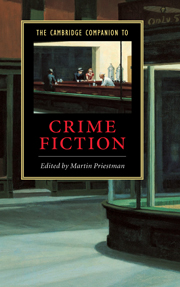Book contents
- Frontmatter
- Introduction
- 1 Eighteenth-century crime writing
- 2 The Newgate novel and sensation fiction, 1830-1868
- 3 The short story from Poe to Chesterton
- 4 French crime fiction
- 5 The golden age
- 6 The private eye
- 7 Spy fiction
- 8 The thriller
- 9 Post-war American police fiction
- 10 Post-war British crime fiction
- 11 Women detectives
- 12 Black crime fiction
- 13 Crime in film and on TV
- 14 Detection and literary fiction
- Guide to reading
- Index
- Series List
2 - The Newgate novel and sensation fiction, 1830-1868
Published online by Cambridge University Press: 28 May 2006
- Frontmatter
- Introduction
- 1 Eighteenth-century crime writing
- 2 The Newgate novel and sensation fiction, 1830-1868
- 3 The short story from Poe to Chesterton
- 4 French crime fiction
- 5 The golden age
- 6 The private eye
- 7 Spy fiction
- 8 The thriller
- 9 Post-war American police fiction
- 10 Post-war British crime fiction
- 11 Women detectives
- 12 Black crime fiction
- 13 Crime in film and on TV
- 14 Detection and literary fiction
- Guide to reading
- Index
- Series List
Summary
Has not the delineation of crime, in every age, been the more especial and chosen thesis of the greatest masters of art …? …In all the classic tragic prose fictions preceding our own age, criminals have afforded the prominent characters and crime the essential material…. The criminal along with the supernatural is one of the two main agencies of moral terror in literature.
The Newgate novel and the sensation novel were sub-genres of the literature of crime, which enjoyed a relatively brief but quite extraordinary popular success in the 1830s and 1840s and the 1860s respectively. The Newgate novel was associated exclusively with male authors. The sensation novelists, on the other hand, included a number of best-selling female authors, and this fact made for important differences of emphasis in the two sub-genres, and also for significant differences in the critical response to them. Both generated debates whose terms extended beyond the literary, and which overlapped in interesting ways. Thus, as well as being entertaining and often absorbing narratives in their own right, these novels and the controversies they engendered tell us a great deal about cultural anxieties and social and literary change at two key points in the Victorian period. Newgate novels enjoyed enormous popularity and some notoriety in the early 1830s, and generated great debate and controversy in the late 1830s and the 1840s.
- Type
- Chapter
- Information
- The Cambridge Companion to Crime Fiction , pp. 19 - 40Publisher: Cambridge University PressPrint publication year: 2003
- 7
- Cited by



